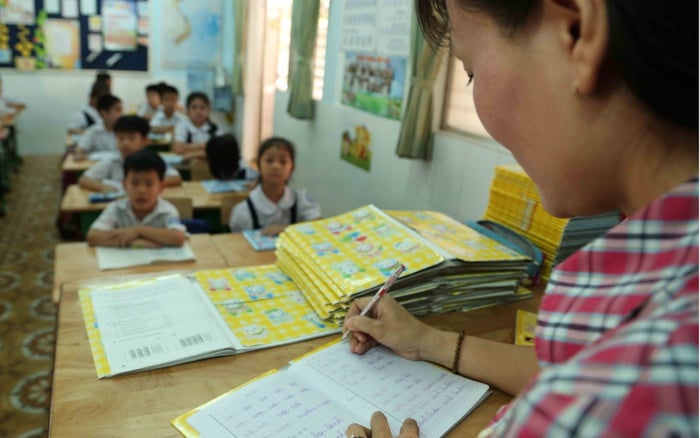The Department of Education and Training of Dak Nong province is investigating and handling the case of a parent beating teacher VTKQ (teacher at Le Duan High School, Quang Son Commune, Dak Glong District, Dak Nong Province) right at her home on the evening of May 25.
The reason was that LMQ, a student at Le Duan High School, was classified as having average conduct; possibly not qualified to take the entrance exam for some universities. Mr. D., LMQ's parent, came to her house to curse and then assault Ms. VTKQ. This incident shows that there are still many problems in classifying student conduct.

Image of teacher Q. being beaten
Disagreement in Conduct Assessment
At this time, teachers are very busy with year-end work such as grading tests, entering scores, summarizing scores, ranking students' academic performance and conduct to conclude the school year as planned (before May 31).
During many years of working as a homeroom teacher, my colleagues and I participated in assessing students' conduct and training. Assessing conduct often causes disagreements and differences of opinion between teachers and teachers, between teachers and parents. Currently, the education sector has two ways of assessing conduct.
In the 2018 General Education Program, Circular No. 22 of the Ministry of Education and Training in 2021 stipulates the assessment of student training results for grades 6 and 7 in each semester and the entire school year, according to 1 of 4 levels: good, fair, satisfactory, and unsatisfactory.
Notably, according to Article 21, Circular No. 22, in the 2022-2023 school year, only grade 10 students will be exempted from conduct assessment and classification, and grades 11 and 12 will still apply Circular No. 58 of the Ministry of Education and Training in 2011.
Therefore, the classification of student conduct in grades 8, 9, 11, and 12 (2006 education program) is still carried out according to Circular No. 58. In Circular No. 58, the Ministry of Education and Training stipulates: "Conduct is classified into 4 categories: good, fair, average, and poor after each semester and the entire school year. The classification of conduct for the entire school year is mainly based on the classification of conduct in semester 2 and the progress of the students."
However, in reality, students' behavior and violations of regulations are varied in form, nature, motive, and level of violation in each case.
Teachers cannot use student A as a standard to judge student B, and cannot compare the conduct of one student with another. Therefore, teachers have a "big headache" when judging students' conduct at the end of the year, and even have to suffer scandals with parents and students.
In addition, the conduct grading causes disagreement among teachers. Specifically, the homeroom teacher always wants the class to have many students with good conduct, "competing" with the class of his colleagues, so he finds every argument to defend the conduct grading like a lawyer defending his client.
In the case of grading conduct as average, poor; satisfactory, or unsatisfactory, teachers need to have a complete file: a report of violation, a self-criticism, a record of violation made by the class, evidence, physical evidence, etc. Then, the teacher must invite the parents of the violating student to coordinate the resolution. If the parents do not agree, a disciplinary council will be established to consider. With such administrative procedures, no teacher is determined enough to pursue the so-called "litigation", so they try to resolve the matter in a "peaceful" manner.

Conduct assessment sometimes causes disagreements and differences of opinion between teachers and between teachers and parents.
ILLUSTRATION PHOTO OF DAO NGOC THACH
"You are so cruel!"
At the end of the 2021-2022 school year, the parents of student NHD (in the 8th grade class I was the homeroom teacher) spoke out against the conduct review board's average classification of D. The parents gave the reason that their child was still young and asked the teacher to forgive them.
Before being classified as having average conduct, D. frequently violated school rules: not wearing a scarf, leaving his shirt outside, dyeing his hair corn-colored, sleeping in class without studying, copying notes, being disrespectful to teachers...
However, the parents said that if their child's conduct was ranked average, it would affect their child's future in front of friends and neighbors, and would affect their future. They came to my house to persuade me, hoping to "improve their conduct".
At that time, I replied to the parents that the school board's decision on student conduct was based on the level of violation and school regulations, not on me personally. The parents left my house with an angry attitude and muttered, "What a cruel teacher!"
Not satisfied, the next day the parents went to school to meet the principal to question him. The principal explained in detail and advised D. to try harder next year and not violate the rules again, then the school would give him a good evaluation.
But unfortunately, after the first semester of grade 9 (school year 2021-2022), D. dropped out of school. The homeroom teacher visited D.'s house many times to persuade him to return to school, but to no avail.
The classification of training and conduct contributes to educating students to follow school regulations well. Therefore, teachers need to handle disciplinary violations and classify conduct according to regulations.
As a teacher, I also hope that parents and students will sympathize with teachers when they have to act as "judges" to judge discipline and conduct. But I affirm that there is no morality that allows parents to beat teachers because their children's conduct is average.
Source link




![[Photo] Prime Minister Pham Minh Chinh chairs the meeting of the Government Party Committee Standing Committee](https://vstatic.vietnam.vn/vietnam/resource/IMAGE/2025/8/23/8e94aa3d26424d1ab1528c3e4bbacc45)

![[Photo] General Secretary To Lam attends the 80th Anniversary of the Cultural Sector's Traditional Day](https://vstatic.vietnam.vn/vietnam/resource/IMAGE/2025/8/23/7a88e6b58502490aa153adf8f0eec2b2)





























































































Comment (0)